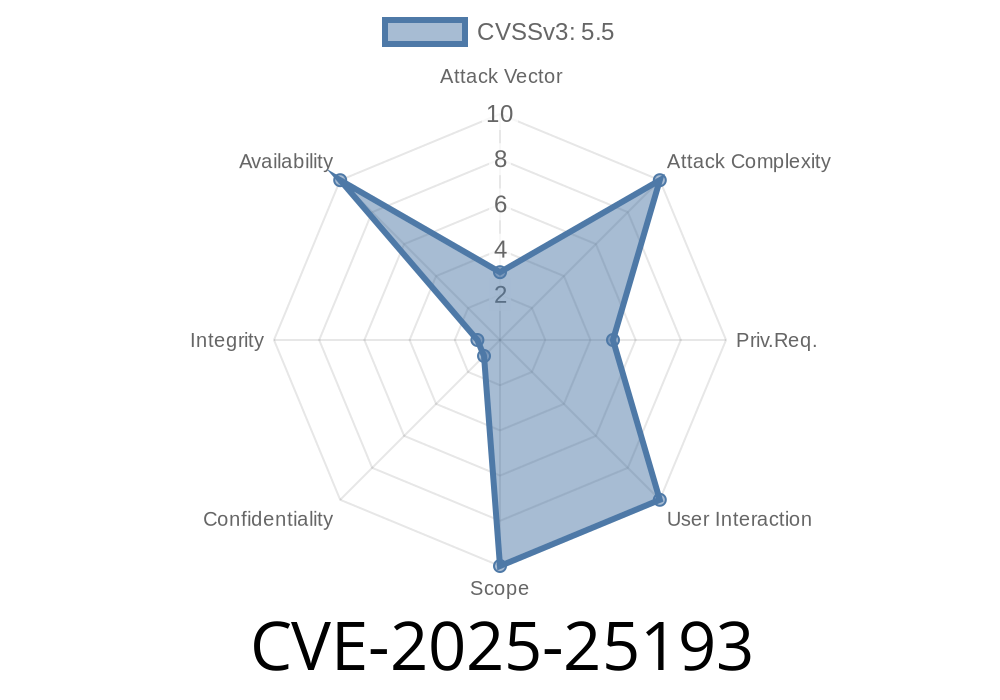Netty is a popular asynchronous event-driven network application framework for rapid development of maintainable high-performance protocol servers & clients. It is widely used in enterprise software and open-source projects. However, recent findings have revealed a critical vulnerability, CVE-2025-25193, which allows attackers to crash certain Netty-based applications running on Windows, potentially leading to a Denial of Service (DoS).
In this article, we’ll break down what CVE-2025-25193 is, how it works, how it can be exploited, and how you can fix or mitigate it in your deployments.
[The Incomplete Patch & How It Was Bypassed](#the-incomplete-patch--how-it-was-bypassed)
- [The Fix: Commit d1fbda62d3a47835d3fb35db8bd42ecc205a5386](#the-fix-commit-d1fbda62d3a47835d3fb35db8bd42ecc205a5386)
Background: What is Netty?
Netty is a networking framework for Java that simplifies building scalable and maintainable network servers. Used in everything from microservices to high-load web APIs, it is a cornerstone of modern Java-based infrastructure.
Details of CVE-2025-25193
CVE-2025-25193 is a vulnerability affecting Netty up to and including version 4.1.118.Final. In certain circumstances, particularly on Windows, Netty attempts to read an environment file that doesn't typically exist. If an attacker can create this file, and make it extremely large, Netty may attempt to read it; this can lead to an out-of-memory crash and hence a denial of service. The issue was only partially fixed in a previous CVE, leaving a bypass possible with special file contents.
The Vulnerable Code
When started on Windows, Netty tries to load system environment configuration by reading a specific file. The problematic code does not properly check file size or particularly, does not count null-bytes when enforcing the maximum size limit of what it reads.
Conceptual vulnerable code example
// This is a simplification for educational purposes!
public static void loadEnvFile(File envFile) throws IOException {
byte[] buffer = new byte[4096];
int len = ;
try (InputStream is = new FileInputStream(envFile)) {
int read;
while ((read = is.read(buffer, len, buffer.length - len)) != -1) {
len += read;
// BAD: NULL bytes in file are skipped, not counted against input limit!
if (len > MAX_ENV_FILE_SIZE) {
throw new IOException("Too large env file!");
}
}
}
// ...process buffer...
}
Null-bytes in the file are not included in the counting for the size limit, enabling an attacker to make the file exceedingly large as long as it is filled with nulls.
Exploit Scenario
1. Attacker creates a huge file at the location Netty tries to read on Windows on the targeted system.
File is filled mainly with null bytes (which the loader ignores when counting for size).
3. Netty application attempts to start, reads the file, and is forced to allocate massive amounts of memory.
4. Application crashes due to out-of-memory or similar resource exhaustion, causing a Denial of Service.
Exploit Code Snippet
The following code creates a large file with mostly null bytes. If an attacker has write permission to the location Netty tries to access, they can run similar code:
# Python exploit code for demonstration ONLY
filename = r"C:\ProgramData\Netty_env"
size_in_gb = 2 # Try any size that can exhaust target's memory
with open(filename, "wb") as f:
f.write(b"\x00" * (size_in_gb * 1024 * 1024 * 1024))
print(f"Large file '{filename}' created.")
When the vulnerable Netty application loads, it will attempt to read and process the whole file, likely crashing on even a beefy server.
Previous Related Issue (CVE-2024-47535)
A very similar issue was tracked as CVE-2024-47535, but the fix did not count null-bytes towards the input size limit, allowing the bug to be exploited again by filling the environment file with nulls.
The Incomplete Patch & How It Was Bypassed
The original patch attempted to add bounds-checking and prevent excessively large files from being loaded. However, it only checked "logical bytes", skipping nulls, as per Netty's string-processing logic. The bypass is simple: create a file full of nulls—these are skipped when checking the limit, so even a huge file can be read before the limit triggers.
The Fix: Commit d1fbda62d3a47835d3fb35db8bd42ecc205a5386
The Netty team addressed the bug fully in commit d1fbda62d3a47835d3fb35db8bd42ecc205a5386. With this patch, the loader counts all bytes—including null bytes—against the input limit. Now, an attacker can no longer sneak large null-padded files past the size checks.
How to Protect Your Application
- Upgrade Netty to at least version 4.1.119.Final (or later), which contains the proper fix for CVE-2025-25193.
- Restrict file permissions: Only allow trusted users to create files in locations Netty tries to read on startup.
- Monitor deployments for suspiciously large files in system or environment directories on Windows.
- Test in pre-production: Run some basic resilience tests with large files to ensure your Java apps don't crash.
References
- CVE-2025-25193 - NVD Entry
- Netty GitHub Security Advisory (GHSA-XXXX-XXXX-XXXX)
- Commit d1fbda62d3a47835d3fb35db8bd42ecc205a5386 (Github)
- Similar Bug: CVE-2024-47535
In summary, CVE-2025-25193 is a clear example of how even small oversights in file parsing can be weaponized for serious disruptions, especially in sensitive infrastructure. If you’re a Java developer or ops engineer running Netty, patch now and review file access policies—don’t leave the door open for denial-of-service attacks!
Timeline
Published on: 02/10/2025 22:15:38 UTC
Last modified on: 02/11/2025 16:15:52 UTC
